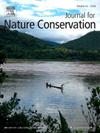废弃手工矿区的恢复:亲生物和生态内疚的影响
IF 2.5
3区 环境科学与生态学
Q2 BIODIVERSITY CONSERVATION
引用次数: 0
摘要
一些关于手工采矿(ASM)的研究为可持续采矿的原因、影响和解决方案提供了全面的文件。不幸的是,关于热爱自然(亲生命)和破坏自然的罪恶感如何影响矿工行为的文献很少。本研究旨在评估生态内疚和亲生物对ASM参与程度和停止采矿意愿的影响,并为退化矿区的恢复提供支持。从Dunkwa-on-Offin(加纳)的矿工那里收集数据,并通过结构方程模型(SEM)、验证性因子分析(CFA)、路径分析和价值-信念-规范(VBN)理论指导下的多组分析进行分析。路径分析证实了VBN理论,认为生态内疚在亲生物性、退出采矿的意图和为恢复计划提供财政和非财政支持的意愿之间起着中介作用。此外,不同性别、宗教、工作类型和收入对生态内疚、亲生命和恢复的交互作用也存在显著差异。热衷于保护环境的国家和非国家行为体,如环境部和世界银行,可以利用这些结果开展进一步的研究,以确定全国各地愿意为恢复服务提供服务的矿工,同时可以为愿意放弃不友好的生态工作的矿工提供替代生计方案。本文章由计算机程序翻译,如有差异,请以英文原文为准。
Restoration of abandoned artisanal mining sites: Effects of biophilia and ecoguilt
Several studies on artisanal mining (ASM) have provided comprehensive documentation of the causes, impacts, and solutions for sustainable mining. Unfortunately, less documentation exists on how the love of nature (biophilia) and the guilt for damaging nature influence miners’ behaviour. This study sought to assess the effect of ecoguilt and biophilia on the level of involvement in ASM and willingness to stop mining, as well as provide support for the restoration of degraded mining sites. Data was collected from miners in Dunkwa-on-Offin (Ghana) and analysed through structural equation modelling (SEM): confirmatory factor analysis (CFA), path analysis and multigroup analysis guided by the Value-Belief-Norm (VBN) theory. CFA indicated a good fit for the constructs under study, with the path analysis confirming the VBN theory, as ecoguilt mediated between biophilia, intentions to quit mining, and willingness to provide financial and non-financial support for restoration initiatives. Also, significant variations were observed in the interactional effects between the ecoguilt, biophilia and restoration per sex, religion, job type and income. State and non-state actors keen on protecting the environment, such as the Ministry of Environment and the World Bank, can leverage these results to initiate further studies to identify miners across the country willing to provide services for restoration services, while alternative livelihood programmes can be provided for miners willing to quit their unfriendly ecological work.
求助全文
通过发布文献求助,成功后即可免费获取论文全文。
去求助
来源期刊

Journal for Nature Conservation
环境科学-生态学
CiteScore
3.70
自引率
5.00%
发文量
151
审稿时长
7.9 weeks
期刊介绍:
The Journal for Nature Conservation addresses concepts, methods and techniques for nature conservation. This international and interdisciplinary journal encourages collaboration between scientists and practitioners, including the integration of biodiversity issues with social and economic concepts. Therefore, conceptual, technical and methodological papers, as well as reviews, research papers, and short communications are welcomed from a wide range of disciplines, including theoretical ecology, landscape ecology, restoration ecology, ecological modelling, and others, provided that there is a clear connection and immediate relevance to nature conservation.
Manuscripts without any immediate conservation context, such as inventories, distribution modelling, genetic studies, animal behaviour, plant physiology, will not be considered for this journal; though such data may be useful for conservationists and managers in the future, this is outside of the current scope of the journal.
 求助内容:
求助内容: 应助结果提醒方式:
应助结果提醒方式:


